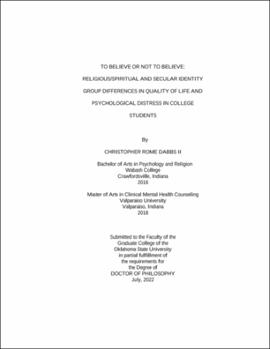| dc.contributor.advisor | Winterowd, Carrie | |
| dc.contributor.author | Dabbs, Christopher Rome, II | |
| dc.date.accessioned | 2023-04-05T16:20:48Z | |
| dc.date.available | 2023-04-05T16:20:48Z | |
| dc.date.issued | 2022-07 | |
| dc.identifier.uri | https://hdl.handle.net/11244/337269 | |
| dc.description.abstract | Religiosity and spirituality often provide core coping structures to believers. College students are regularly put into novel situations and environments in which they must rely on their coping mechanisms, including practices that stem from their potential religious/spiritual identities. However, religious identity group differences in college students is an under-researched area of the literature. The purpose of this study was to explore differences in religious, spiritual, and secular (RSS) college students’ levels of psychological distress and quality of life while centering their identity and participation in meaning-making groups. College students were recruited through Facebook, email, and survey management software. A total of 607 college students participated in the online survey which included a demographics page, the Depression, Anxiety, and Stress Scale-21 (DASS-21; Lovibond & Lovibond, 1995), and the World Health Organization Quality of Life-Brief measure (WHOQOL-BREF; World Health Organization, 1999, 2012). Participants who identified as spiritual and religious reported a more satisfied quality of life than i) secular participants as well as ii) participants who identified as either spiritual or religious (but not both). Participants who attended spiritual and/or religious meaning-making groups reported less anxiety, as well as enhanced aspects of quality of life including psychological, social, and environmental well-being than participants who did not attend religious and/or spiritual groups. College student participants who attended spiritual/religious groups and college student participants who attended secular meaning-making groups did not differ in their quality of life nor psychological distress experiences. These findings contribute to the dearth of college student research literature exploring the potential protective factors of both RSS identity and RSS meaning-making group participation. | |
| dc.format | application/pdf | |
| dc.language | en_US | |
| dc.rights | Copyright is held by the author who has granted the Oklahoma State University Library the non-exclusive right to share this material in its institutional repository. Contact Digital Library Services at lib-dls@okstate.edu or 405-744-9161 for the permission policy on the use, reproduction or distribution of this material. | |
| dc.title | To believe or not to believe: Religious/spiritual and secular identity group differences in quality of life and psychological distress in college students | |
| dc.contributor.committeeMember | Berry, Thomas | |
| dc.contributor.committeeMember | Miller, Bridget | |
| dc.contributor.committeeMember | McGaha, Valerie | |
| dc.contributor.committeeMember | Khojasteh, Jam | |
| osu.filename | Dabbs_okstate_0664D_17538.pdf | |
| osu.accesstype | Open Access | |
| dc.type.genre | Dissertation | |
| dc.type.material | Text | |
| dc.subject.keywords | community | |
| dc.subject.keywords | distress | |
| dc.subject.keywords | psychology | |
| dc.subject.keywords | religion | |
| dc.subject.keywords | spirituality | |
| thesis.degree.discipline | Psychology | |
| thesis.degree.grantor | Oklahoma State University | |
